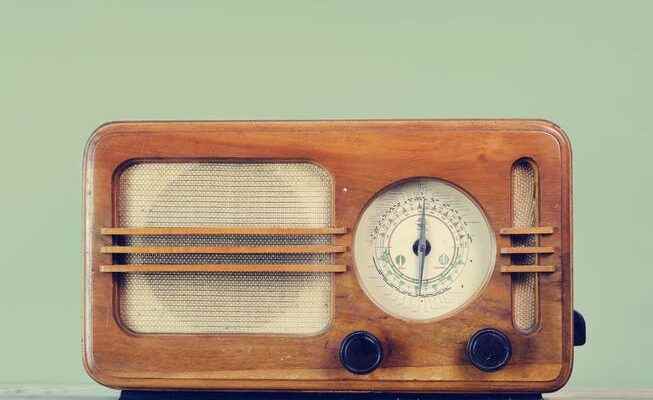The first programs went on the air around a hundred years ago. The medium was used to drum for “total war” as well as to promote literary careers – as the author Stephan Krass shows in a book on the radio age.
The device may soon have had its day: many radio programs are now consumed via the Internet.
In April 1951, Max Frisch traveled to New York at the invitation of the Rockefeller Foundation and provided with a stipend of $330 a month. He supplemented his income with orders from Swiss radio. Freshly written travel reports, reported on chance encounters in his everyday life, observed newer developments in the theater and in the musical life of the metropolis.
“The tapes recorded in America with interviews and original sounds”, writes the German radio editor, author and honorary professor Stephan Krass in his book “Radio Zeiten”, “Max Frisch sent by post across the ocean. They were technically and editorially processed in Zurich before they were broadcast in magazine programs or as separate contributions.»
For Frisch, the close collaboration with the radio remained an episode that ended in 1952 with his return to Switzerland. He wrote his first radio play without ever having heard one before, and he didn’t even own a radio. He had difficulties with the technical processes involved in making radio. “Several times,” says Krass, “the editors had to remind him to set the correct tape speed on the recording device.” In the early years of his career, he viewed the acoustic medium less as an extension of his aesthetic space than as a basis for a welcome subsidy towards his living expenses.
In this respect, Frisch was far from alone. “Without the patronage of public broadcasting – that much is certain – German literature would be poorer by many significant texts and voices.” Think of Martin Walser, who began his career as a studio director in the recording studios of the Süddeutscher Rundfunk, or Alfred Andersch, who shaped the intellectual night program of German radio with series such as “Abendstudio” and “Radio-Essay” – at times with the assistant Hans Magnus Enzensberger.
Request concert and war propaganda
The episodes described by Krass, which begin with the transmission of the first official radio program in Germany on October 29, 1923 and end with the triumph of the podcast, repeatedly make clear the close connection between the history of politics, culture and technology. From the 1920s, radio technology became an essential part of modern aviation as a tool for flight navigation and wireless radio communications.
Adolf Hitler, we learn, could not develop his rhetorical talent in the anechoic room of a radio studio. “The voice is not as unsympathetic as one might think – it just smells a bit like the seat of your pants, like a man, unappetizing, but otherwise it’s fine,” Kurt Tucholsky wrote in 1922 to his fellow writer Walter Hasenclever. “Sometimes he screams at himself, then he throws up. But otherwise: nothing, nothing, nothing. No tension, no highlights, he doesn’t grab me.”
Since the spark did not fly, there are no studio recordings of Hitler’s voice. His broadcast speeches were either broadcast live or pre-recorded with an audience. The National Socialists’ synchronized radio reached large parts of the population with the help of the people’s receiver and a mixture of fascist propaganda and entertainment. In the last months of the war, the popular “request concert” and the agitation for “total war” could be heard alternately on the same frequency.
When small and handy transistor devices with telescopic antennas were sold from the mid-1950s, the way music was consumed also changed. Now the whole family no longer gathered in front of the heavy tube set in the living room in the evening. “You could carry the portable radio around the house, listen to a request concert in the kitchen or in the hobby room, blast your neighbors with rock ‘n’ roll over the fence in the garden, or gather a bunch of people around the towel in the swimming pool.”
«Gourmet of cannibals»
The offshore stations of the so-called pirate radio stations that emerged in the 1960s circumvented the ban on privately operated radio stations and responded to the need of the post-war generation for more freedom and adventure. In the meantime, podcasts distributed via the Internet seem to have ushered in the end of linear radio. “Slowly”, notes Krass at the end of his excursions into radio history, which are as entertaining as they are instructive, “it is time to remind the public broadcasters that they are sitting on enormous archive treasures and that the media libraries would be the right forum to finally close them to lift.”
Back to Max Frisch: in the Swiss radio archive there is a box with a report by the author entitled “Encounters with Negroes”. It contains the original audio tape and a note with an erasure note. Someone had put the tape back in the box after the erasing process and sorted it back into the compartment with the writer’s other audio recordings. Only because there is a text version of the recording do we know that it actually contains discriminatory language. For example, when at a church service by Afro-Americans, Frisch feels reminded of “shouting like from the jungle” or “a prayer of cannibals”.
However, those passages in which the writer acts as an advocate for black rights also remain hidden. According to Krass, the deletion action made it impossible to deal with the content of the historical audio document. And the radio enthusiast finds that “from an archival point of view – to put it kindly – counterproductive”.
Stephan Krass: Radio times. From ether spooky to podcast. Verlag Zu Klampe, Springe 2022. 256 pages, CHF 33.90.
